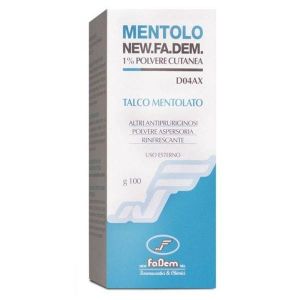Ship in Europe, Find out rates!

New Fadem Menthol Antipruritic Skin Powder 100g
NEW FA.DEM.
Therapeutic indications
The medicine is indicated in the symptomatic treatment of skin rashes due to exanthematous diseases, irritation, including from rubbing, itching and burning in case of insect bites, sunburn and burns.
Dosage
Evenly sprinkle the affected area 2 or more times a day.
Overdose
Accidental aspiration of high concentrations of the drug can cause severe respiratory damage. Menthol Following application of menthol in the nostrils, there have been reports of apnea and immediate collapse in children. Ingestion of menthol can cause severe abdominal pain, nausea, vomiting, dizziness, ataxia, drowsiness and coma, and if in contact with the eyes it can cause redness and irritation.
Contraindications
Hypersensitivity to the active substance (s) or to any of the excipients. Contraindicated in children under 2 years of age due to the risk of laryngospasm and convulsions.
Side effects
The following are the side effects of menthol organized according to the MedDRA organosystem classification. Insufficient data are available to establish the frequency of the listed effects. Skin and subcutaneous tissue disorders Contact dermatitis. Cases of umbilical granulomas have been reported due to contamination of the umbilical cord residue with talcum powder.
Pregnancy and breastfeeding
For menthol, no clinical data on exposed pregnancies are available. Caution should be exercised when prescribing the medicine to pregnant women.
Special warnings
The medicine is to be used for external use only; it must not be inhaled and must not be applied to eyes and mucous membranes. It should not be applied to open wounds or surgical gloves. Menthol New.Fa.Dem. should be used with caution in children up to 6 years of age. Routine use in the baby's daily hygiene is not recommended as inhalation can cause lung irritation with the risk of severe breathing difficulties and death. In case it is suspected that the child has inhaled Menthol New.Fa.Dem. , respiratory function should be closely monitored as the onset of symptoms may be delayed for several hours. Hemolysis and kernicterus may occur in neonates with glucose 6 – phosphate dehydrogenase deficiency exposed to menthol. Important information about some of the ingredients: Talc. Abuse of intranasally administered medicinal products containing talc as an excipient has been reported to cause pulmonary granulomas. Although talc does not cause acute toxicity, fatal cases have been reported following acute exposure to talc. Inhalation of the poor caused death, mainly in infants. Inhalation of talc causes irritation of the respiratory tract, coughing, wheezing, sneezing, vomiting, and cyanosis. The onset of these symptoms can occur within 12 - 24 hours. Acute exposure can cause permanent lung effects. Intense and prolonged exposure to talc can cause pneumoconiosis. When injected intravenously it can cause retinopathy, emboli and pulmonary hypertension. Applying talc to open wounds can cause severe granulomatous reactions. Talc is a highly irritating agent for the eyes and can cause symptoms, in some cases requiring surgical correction.
Expiry and Retention
None in particular. Store in a tightly closed container at a temperature not exceeding 30 ° C.
Active principles
100 g of powder contain: Active ingredient: 1 g menthol. For the full list of excipients, see section 6.1.
Excipients
Talcum powder.
| Destination | Cost | Detail |
|---|---|---|
| Italy | €5,90* | 24/72H |
| Austria, France, Germany, Slovenia | € 13* | 3 days |
| Belgium, Luxembourg, Portugal, Netherlands, Spain | € 14* | 4 days |
| Bulgary, Cechia, Hungary, Poland, Romania, Slovakia | € 19* | 5 days |
| Denmark, Estonia, Finland, Ireland, Lithuania, Latvia ,Sweden | € 22* | 5 days |
| United Kingdom, Switzerland, Greece | € 30* | 7 days |
| Canada, USA | € 40 | 7 Days |
European shipments with express courier: FedEx, MBE, DHL
*For the shipment outside band B ther's an extra cost of 22€ *For the shipment outside band C ther's an extra cost of 30€ Delivery Times exclude Saturday and Holidays
For Islands and Areas of difficult Accessibility the shipments are made in 72 hours and the cost will be increased by 15€